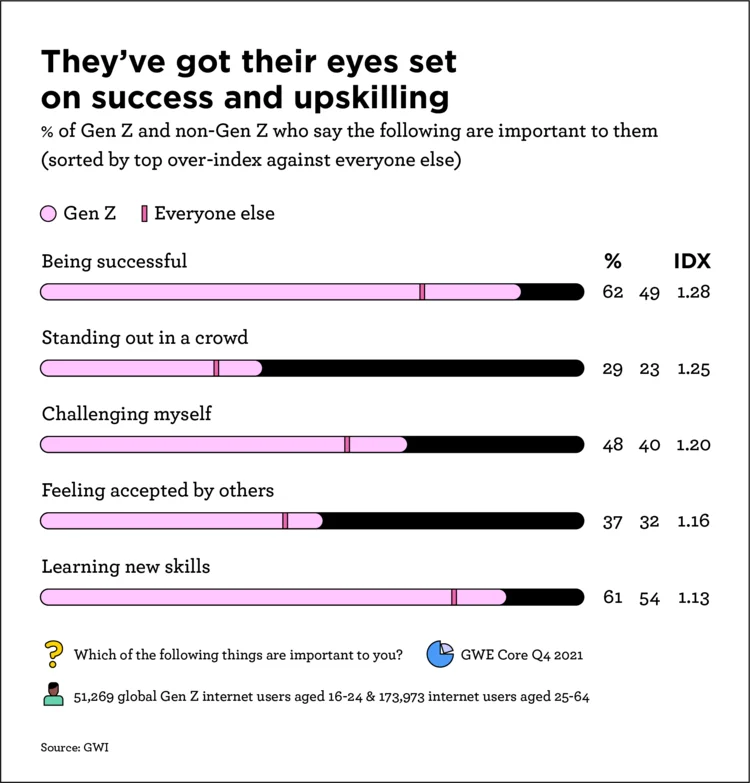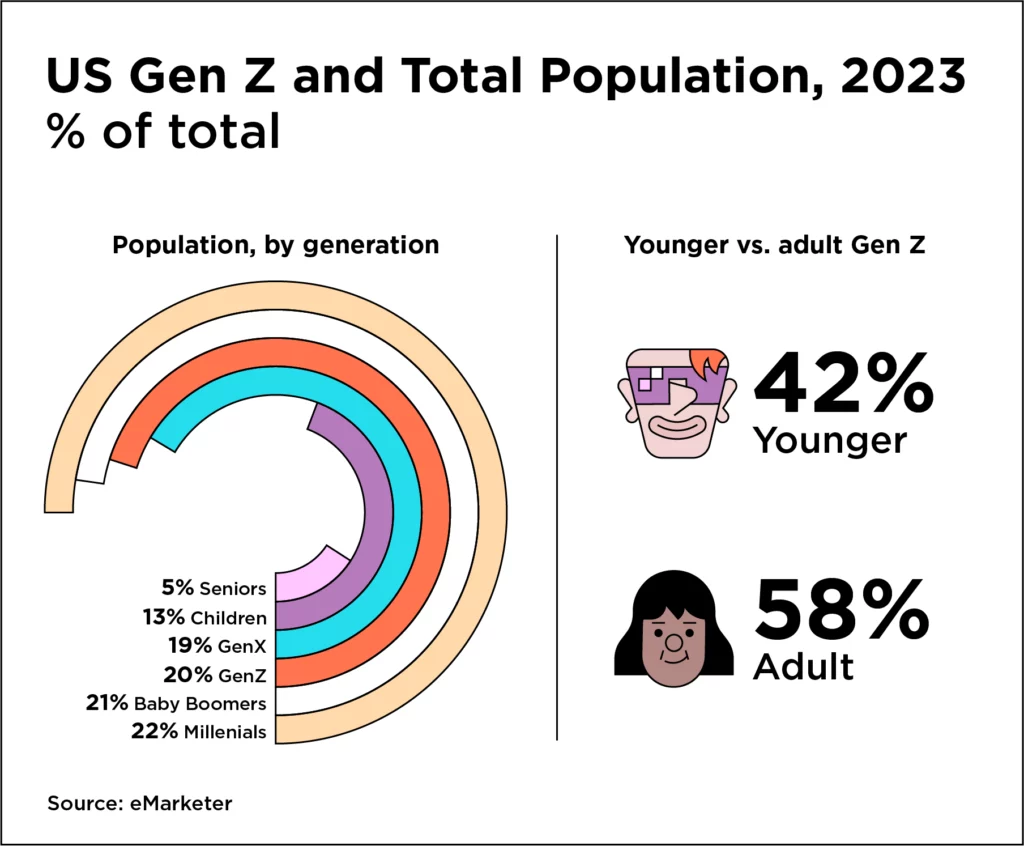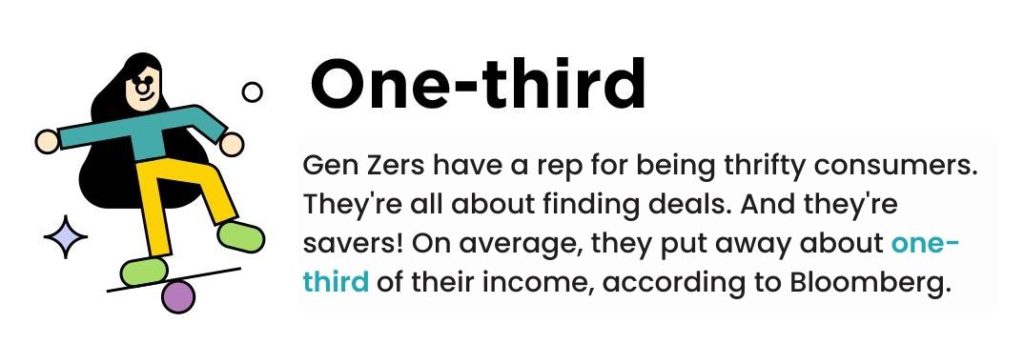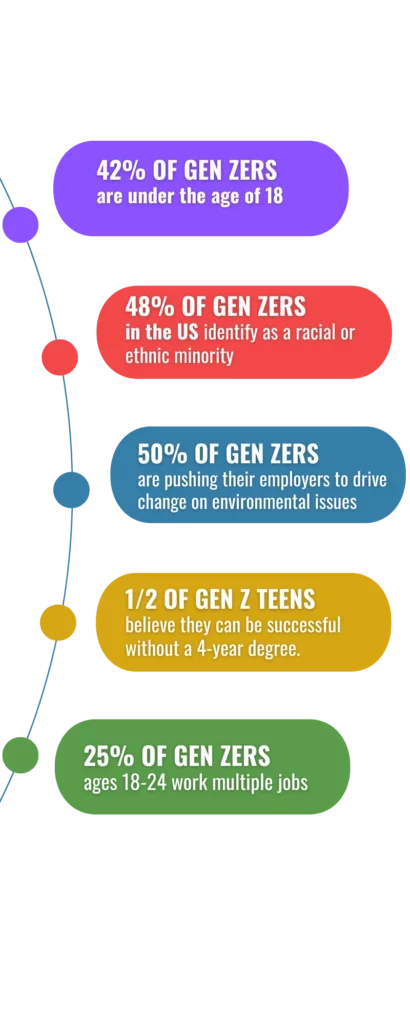After years of collecting data, updating stats, and putting out strategy-focused content to help marketers run influencer campaigns, we thought it would be really cool to build a multimedia collection of the insights we’ve gathered on Generation Z characteristics from some of our favorite sources, including Pew Research, McKinsey, Forrester, Think with Google, Klarna, and YPulse to name a few.
Because we get it – it’s important to stay on top of trends in a rapidly evolving digital landscape, where Generation Z holds immense influence and purchasing power. So, we built this Insights Hub (and a bunch of other ones), to provide you with comprehensive information and actionable strategies that’ll help you engage, connect, and thrive in the wonderful world of Generation Z.
Who Is Generation Z?
The Definition of Generation Z
Generation Z, often referred to as Gen Z or Zoomers, represents the cohort of individuals born roughly between 1996 and 2012ish. While the exact dates defining this generation may vary, they are commonly considered the successors to Millennials.
They’re Digital Natives
Generation Z is the first generation to have grown up entirely in the digital era. They have been exposed to technology from an early age, seamlessly adapting to smartphones, social media platforms, and a hyper-connected lifestyle.
This innate familiarity with digital tools and online platforms has influenced their communication style, information consumption patterns, and overall digital fluency. Much of the communication that you see now from companies, is patterned after the behaviors of Millennials and Gen Z.
Growing up in a rapidly advancing digital age, Generation Z has been deeply influenced by technology and the internet, shaping their behaviors, preferences, and outlook on the world. They represent the first generation who are truly digital natives. They have grown up surrounded by technology, social media, and instant connectivity. To give you a bit of context, the oldest Zoomers were only in first or second grade when MySpace launched in 2003.
With a unique set of characteristics and preferences, this generation is reshaping industries, challenging traditional marketing practices, and revolutionizing consumer behavior. So, let’s get into ALL THINGS GEN Z.
Generation Z Values
Diversity and Multiculturalism
As the most diverse generation of Americans in history, Generation Z is characterized by its diversity. About 49 percent of Gen Zers identify as an ethnic or racial minority. This generation embraces multiculturalism, with members representing a wide array of ethnic backgrounds, cultures, and identities.
They value inclusivity, diversity, and equality, and expect brands and organizations to reflect these values in their practices. Gen Z’s embrace of diversity extends beyond ethnicity and encompasses gender, sexual orientation, and socioeconomic backgrounds.
Socially Conscious
Generation Z is all about making a difference! Whether it’s fighting climate change, pushing for racial justice, promoting gender equality, or supporting mental health, Gen Zers actively look for ways to have a positive impact on the world.
The term “slacktivist” gets floated around as means of identifying social media users whose fervent interest in a social cause doesn’t extend beyond the virtual walls of their favorite social media platform. But those who use that term often don’t consider the power of social media to influence the mass and be used as a call to arms for supporters of different causes.
According to Pew Research, Gen Zers and Millennials cast a quarter of the votes in the 2018 midterm elections. No small feat when you consider that 4.5 million votes that were estimated to be cast in 2018 were from a generation of voters who weren’t even old enough to vote in the previous midterm elections.
Hustle
Gen Z is all about that hustle! For this group, hustle matters because success matters. Getting 1 percent better every day – that whole situation? That matters. Gen Z has an incredible entrepreneurial spirit that starts very early on. These guys are go-getters! Compared to other generations, Gen Zers over-index on:
- Being successful (62 percent of Gen Zers prioritize success vs 49 percent for everyone else)
- Learning new skills (61 percent vs 54 percent)
- Challenging myself (48 percent vs 40 percent)
Gen Z is all about those side hustles, personal branding, and entrepreneurial ventures. They aren’t known for waiting for opportunities to come knocking; they’re out there creating their own paths. So, as they enter the workforce into corporate environments with rules, traditions, and red tape, it’s easy for older professionals to mistake their alacrity as entitlement.
So, independence and autonomy are major buzzwords for Gen Z.

Personalization and Authenticity
Generation Z seeks personalized experiences and authentic connections. They value brands and companies that understand their individuality and cater to their specific needs and preferences. Traditional marketing methods often fall short with this generation, as they can quickly identify inauthentic or generic attempts to engage with them.
Hyperconnected and Visual Communication
Communication for Generation Z is mostly visual and usually instant. They are experts at using emojis, memes, and visual content to express themselves. Short attention spans, attributed to the constant flow of information, have made Gen Z highly skilled at filtering through content quickly. They prefer bite-sized, easily digestible information and have a strong affinity for video and visual platforms such as YouTube, TikTok, and Instagram.
What Is the Population of Gen Z? Well… Kinda Depends on Where You Are
Gen Z holds the distinction of being the third-largest generation in the United States after Millennials and Baby Boomers, making up 1 in 5 Americans (or 20.6 percent). In Canada, the numbers are a bit lower, with Gen Z encompassing roughly 18 percent of the Canadian population. However, their representation varies significantly across different countries. For instance:
- In Australia, Generation Z accounts for nearly 20 percent of the country’s population.
- In China, Gen Z constitutes around 16 to 18 percent of the nation’s inhabitants.
- In Japan, Gen Zers make up 13 percent of the nation’s population.
- On the continent of Africa, Gen Zers make up 31 percent of the population.
- And they account for as much as a quarter of the population in Nigeria, a country where more than half the population is under the age of 18.

Gen Z Money Moves: How Gen Z Earns, Saves, and Spends
Let’s talk about Generation Z and their money. In America, there are approximately 7.3 million full-time Gen Z workers who collectively earn a staggering $229 billion in full-time employment wages. Part-time employment contributes around $70 billion per year to their earnings. And since this cohort is still making its way into the workforce, we actually have to talk about allowances. Yeah. Allowances provided to Gen Z individuals amount to an impressive $57 billion per year. These statistics highlight the significant financial impact and economic potential of Gen Z in the workforce.
If ever there was one generation that had a gift for hustling, it’s Generation Z. They’re not afraid to dive into the gig economy! About half of Gen Zers freelance to earn money (or more money), generating a substantial income of $40 billion per year from side gigs and freelance work.
They understand that in the current landscape, they have options. They don’t have to be tied to a desk to make money. They launch online businesses and create content on platforms like YouTube or TikTok to monetize their skills and passions. They’ve got that entrepreneurial spirit and they know how to leverage technology to their advantage.

They’re Savers
But what about saving? You might be surprised to learn that one of the defining characteristics of Generation Z is that they’re actually pretty money-savvy. Why? Well, think about it – they witnessed economic uncertainty and are determined to build a secure future. Many of them prioritize saving from an early age, whether it’s for education, investments, or simply building up an emergency fund. They’re all about that financial independence and having a safety net.
But They’re Also Spenders
Now, let’s talk Gen Z spending habits. What makes Gen Z want to buy? That’s what all the cool kids wanna know. Well, they’re not your traditional spenders. Gen Z values experiences and purposeful purchases. They’re more likely to spend on travel, events, and unique experiences that create memories. And when it comes to products, they’re all about brands that align with their values. Gen Z is known for their love of sustainable, ethical, and socially responsible companies. They want to feel good about where their money is going.
Does Gen Z Tip? Yes… If You Earn a Tip🤨
This one is a popular question right now, and the answer is simle, but has a backstory.
#1 Tipping for All the Things. First of all, tipping practices are changing. You may have noticed that places that didn’t ask for a tip a year ago, all want you to determine – from transaction to transaction – whether you’re going to tip if you happen to make a point-of-sale purchase using a debit or credit card from a point of sale. So, there are more establishments (not necessarily people) requesting tips that may or may not go to the people actually serving you. #thatpart
#2 Gen Z dines out. Percentage-wise, they are least likely to be employed. Convenience-wise, however, Gen Z is the most likely generation to grab takeout. According to Morning Consult, 51 percent of Gen Zers polled say they have treid a new restarant in the last month, compared to 40 percent of all adults.
#3 Facts. Lean pockets + an affinity for eating out + an increase in random establishments requesting tips means that a generation who values authenticity, transparency, fair wages, and corporate responsibility is not going to be overly inclined to tip their hard-earned money (or their parent’s hard-earned money) without believing the tip’s been earned or that they see a compelling enough reason to do so.
Ready to 🐇-hole on all things Gen Z? Check out some of our other articles.
Generation Z’s Game-Changing Impact on Industries, Markets, and Marketing
Today, we’re witnessing a wealth of insights around how Gen Z is transforming corporate culture and reshaping the CSR landscape. But here’s the kicker: a whopping 42 percent of Generation Z is still on their journey to adulthood.
Currently, Gen Zers make up about 12 percent of the US labor force, according to the US Bureau of Labor Statistics. That number’s set to jump to 27 percent in the next two years. Which means…
Not only are they shaping corporate culture and changing the way companies do business, but Gen Zers are doing so largely as culturemakers and consumers, not as employees or company stakeholders.
The Influence of Gen Z on Corporate Culture and CSR Landscape is Just the Beginning
Gen Z has made its mark across various industries, catalyzing significant transformations from fashion and beauty to technology and entertainment. The way Gen Z consumes content on platforms like TikTok has prompted fundamental shifts in how other platforms including giants like Instagram and Facebook present content, moving from connection-based algorithms to interest-based algorithms.
As a result, brands have had to adapt and recognize that simply staying on-brand is no longer enough to raise awareness. They now understand the importance of being interesting and relatable to capture the attention of Gen Zers. This shift has compelled brands to completely revamp their social media marketing strategies. It’s a massive change.
Gen Z and Sustainability: Authentic Action, Not Empty Promises
Gen Z also places great importance on sustainable and ethical practices, pushing industries to take genuine responsibility for their actions and actively support the communities they operate in. Younger consumers prefer to spend their money with brands that align with their values both internally and externally. Nearly 4 in 10 younger Gen Z individuals expect brands to demonstrate social responsibility, while 3 in 10 expect brands to actively contribute to their local communities.
Consequently, brands must embrace social responsibility and community involvement if they want to establish long-term relationships with Gen Z consumers.

Generation Zers tend to lean on their moral compass with a strong inclination to stand up for what’s right. They prioritize critical issues such as healthcare, mental health, education, financial stability, civic engagement, racial equality, inclusion, and environmental conservation.
When it comes to healthcare… Gen Z is looking for convenience, efficiency, and transparency. They readily embrace telemedicine and are comfortable sharing personal information during virtual appointments.
Mental health… holds significant importance for Gen Z. A frequently cited study conducted by the American Psychological Association reports that when surveyed 27 percent of Gen Zers say they would describe their mental health as fair or poor, compared to 15 percent of millennials and 13 percent of Gen Xers. They are more likely than previous generations to be transparent about, and to seek treatment for their mental health struggles.
In higher education… Gen Z prioritizes skill acquisition for their careers, but for many Gen Zers, that no longer means a traditional four-year degree. According to a recent study conducted by ECMC Group, only 51 percent of Gen Z teenagers express interest in pursuing a four-year degree. That’s a huge drop off from the 2020 figures in which 71 percent reported wanting to head to college. Additionally, over a span of two years, there has been a 6.6 percent decrease in total undergraduate enrollment between the fall semesters of 2019 and 2021.
Financial security… They aspire to stable, well-paying jobs and aim to avoid burdensome student loan debt. They are open to non-traditional educational paths and entrepreneurial pursuits. The financial impact of COVID-19 has affected them negatively, but it has also made them more financially cautious.
Government involvement… Gen Z is not content with passive observation; they actively strive for change. They believe in the government’s role in addressing social issues and utilize social media platforms to advocate for causes, displaying high levels of online engagement.
Equality is a core value… Gen Zers champion diversity and work toward ensuring equal opportunities for all. They acknowledge the flaws in the system and support organizations that combat systemic racism.
Environmental concerns… Generation Z members are deeply concerned about climate change and expect brands to take a stand on environmental issues. Deloitte’s 2023 Gen Z and Millennial Survey reveals that 15 percent of Gen Zers believe they can positively influence their organization’s sustainability efforts. They are willing to invest more in sustainable products and show a preference for supporting environmentally conscious brands.
Conclusion
Understanding Generation Z means understanding Gen Z characteristics – that values and beliefs that make Zoomers such a standout group. These insights are key for businesses, marketers, and society as a whole. Gen Z habits, digital fluency, and social media wizardry are reshaping industries and pushing boundaries. By speaking their language, embracing innovation, and reflecting their aspirations, we can build meaningful connections and create a future that thrives with Gen Z’s dynamism.
As Gen Z continues to make waves, their impact will reshape everything—from commerce and technology to the way we connect and thrive together. So let’s tune in to their vibes, celebrate their uniqueness, and join forces to create a world that’s vibrant, inclusive, and bursting with youthful spirit for this extraordinary generation.







